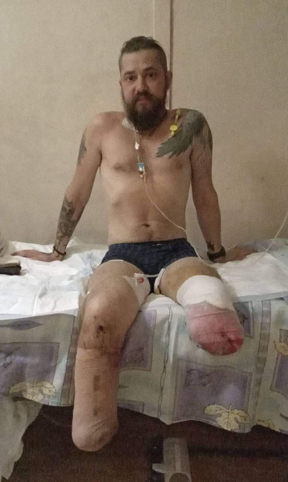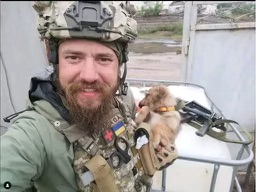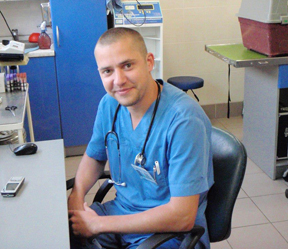Ukrainian veterinarian-turned-soldier tells of combat, losing both legs and future plans
Olexiy Prytula

Photo courtesy of Dr. Oleksiy Prytula
On Sept. 30, a Russian projectile struck Dr. Oleksiy Prytula as he attempted to rescue wounded Ukrainian troops in Lyman. Doctors amputated his legs. Prytula has had four surgeries to date, and more are on the horizon.
Let me introduce myself. My name is Oleksiy Prytula. I'm a 41-year-old happy man with the best family in the world. I'm married to my incredible wife, Julia, of more than 14 years, and we have a 7-year-old daughter. She is a curious, cheerful, smart and beautiful little princess.
We live in Odesa, but I'm from Izmail. It is a small city near Odesa and the coast of the Black Sea.
I started my education at Odesa State Agrarian University in 1998, and studied in the Faculty of Veterinary Medicine. But after graduating in 2003, I did not go into the profession. Instead, I tried a lot of different jobs, from sales to logistics. I did not discover my true passion for veterinary medicine until 2011, when I got a job as a therapist at one of the best veterinary hospitals in Odesa. I learned a lot during my years there, attending trainings and seminars, and I read a lot of literature to develop an expertise in veterinary dermatology.
I became head of the practice's dermatology department in June, and I worked in this role until I decided to go to the war to protect my family and country.
During the first days after Russia invaded Ukraine in February, it was hard to leave the house because of civil panic. But when I wasn't working at the veterinary hospital, I volunteered with my wife, cooking for our military. We donated blood.
Russia's attack didn't surprise me. I've always known that Russia's forceful annexation of Crimea, Donetsk and Luhansk would only be the beginning. After Russia annexed Crimea in 2014, I tried to enter the National Guard of Ukraine, but they didn't take me. So I decided to continue to do what I loved by helping the animals of Odesa and my patients.
Despite my inexperience in the military, Julia supported my aspirations to protect my country and I became more confident. Soon after Ukraine was attacked, I journeyed to a military training center and stayed there for a month, learning a lot of new physical exercises, weaponry and combat information. I underwent a physical and mental transformation that led me to become a rifleman in an airborne assault platoon.
At the beginning of August, I was assigned to the 25th Airborne Assault Brigade. My next few months in the field began in a military unit stationed in eastern Ukraine, with main operations near Kharkiv and Donetsk. My first military operation involved eight days with no connection to civilization. I had been positioned to protect an area near Bahmut, and Russia used all its weapons for the attack. I spent days in a trench with one main task: defend my area.
Deoccupation of Izium
Olexiy Prytula in practice

Photo by Dr. Oleksiy Prytula
Prytula headed to the front lines of Ukraine's war with Russia after the country was invaded. For three months, he encountered combat regularly.
Fighting is nothing like training; there is no romance in war. They go for everyone, attacking civilians along with the military.
My second operation was to liberate Izium, a city on the Donets River in Kharkiv Oblast of eastern Ukraine, from its enemies. This was my first experience defending against an airborne assault. It wasn't easy, but we did it by storming and liberating villages, and clearing settlements and landings.
The Russians abandoned everything. Now you can see the Ukrainian flag flying in the city.
In mid-August, I moved to a new army unit with a new boss. We were all getting to know each other. We needed to work as a team, because my life depended on my guys in the platoon.
Our platoon was among the first to clear the Izium territory from the Russians. While on the road, our infantry fighting vehicle broke down, and we needed to find other transport. One of our commanders offered us another vehicle, and within a few days, we had cleared the city. It was inspiring.
But within a week, we had a new mission: to attack our enemies in the city of Lyman, in Ukraine's eastern Donetsk region. The mission was started on Sept. 20.
Because of my background in veterinary medicine, my commander temporarily transferred me to the medical platoon as a paramedic to deal with losses: 200 soldiers were dead and another 300 were injured. My new mission was to save our guys by heading to the front lines to drag the injured from positions as close as possible to the fighting. The worst parts of my job involved collecting the remains of the deceased. We wore rubber gloves and collected their body parts in bags. It was hell on Earth.
Forever changed
Olexiy Prytula office

Photo courtesy of Dr. Oleksiy Prytula
Before heading to battle, Prytula practiced at the Aybolit Hospital of Veterinary Medicine in Odessa.
It was around 9 a.m. on Sept. 30, and I was trying to evacuate some of our guys to save their lives, when the Russian artillery struck our position. We were caught under artillery fire. Shards of bombs damaged our car. Thank God it was only the car that was damaged. Me, the driver and an injured soldier we were rescuing were OK.
But as the day wore on, the artillery strikes got bigger. We had a mission to evacuate another injured soldier from the battle line where there was active shooting, but we decided to forgo driving to those who needed our help. The sky was full of cluster shell bombs. I tried to hide by a big tree stump, but it wasn't enough to shield all of me. I heard an explosion, and my feet felt like they were on fire. I lost consciousness for a few seconds. When I awoke, I put a tourniquet on my feet and told the guys around me that I needed help. I was among the severely wounded.
My unit didn't know what to do with me, because they are soldiers, not medical personnel. They loaded me into an infantry vehicle, and it was a hard road to another car, and another, and another. It was hours before they could deliver me into a military hospital, where I immediately went into my first surgery. Both of my legs, in fragments, were amputated.
I called Julia. It was hard to find the right words, but I felt her unbelievable support. I was alive. She said that was the most important thing.
That day, I began the struggle for my life. I want to have a good life with my family in an independent country. I want my life to be normal.
I was transferred to another hospital in Kharkiv, where I had another surgery. Julia came to visit. It was great to see her, to hug her. It was hard for us both to hold back our tears.
A few days later, I was transported to yet another hospital, this time in Kyiv. I had two more surgeries, and I'll be staying here until I'm taken to where I'll have followup care and likely more operations.
I know that my recovery will be hard, but I will get through it with the support of my family, friends and Ukraine. We will win. Democracy and freedom will win. And I will win. I want to have a bright future. My hope is to find a prosthetics program. One of my legs was amputated to the middle of my shin. The other is now higher than my knee.
I plan to do my best to win in this struggle. In six months, I'll be in the middle of recovery. In six years, I will be a happy father and husband with a full life. I will not stop traveling, and advancing my career in veterinary medicine. I will continue to do my best for the profession in Ukraine, to better the lives of my animal patients.
This is not the end of my story. This is just a beginning.
This commentary was compiled by VIN News Service reporter Jennifer Fiala from correspondence with the author over WhatsApp. Since Russia's retreat from Izium, reports have emerged of mass graves with the bodies of civilians found in the city. In early October, besieged Russian forces reportedly withdrew from Lyman. Their surrender of the town that had been under Russian occupation since May marks a significant military victory for Ukraine as the nation continues its counteroffensive against Russian President Vladimir Putin's territorial claims.